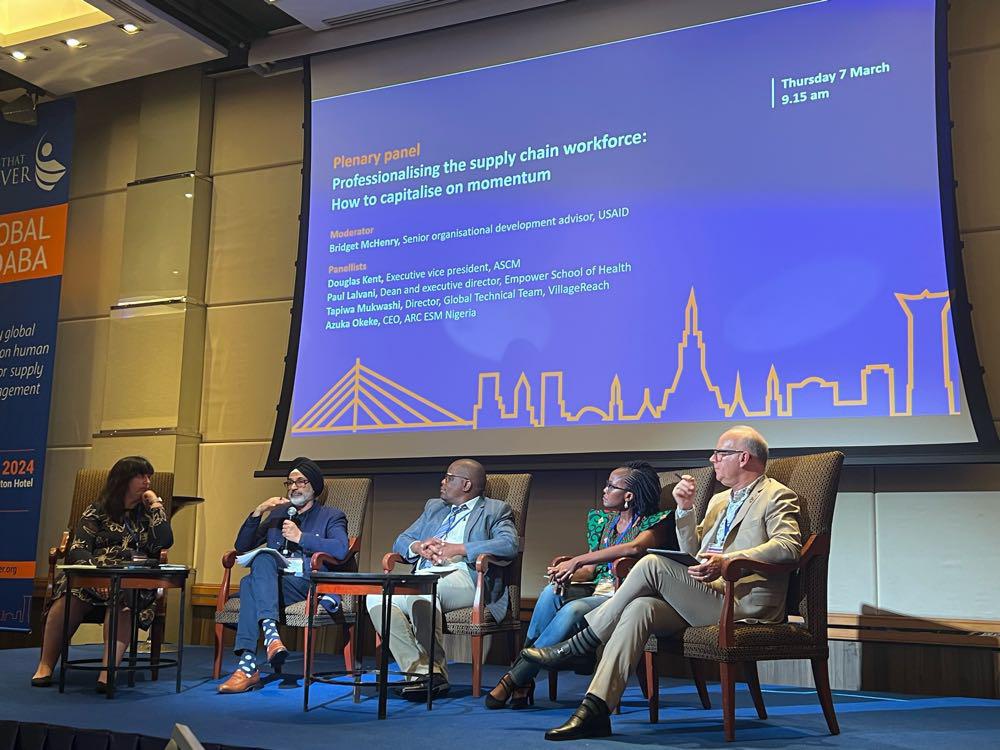In case you didn’t know, supply chain is sexy.
These were the words of ASCM’s Douglas Kent during today’s plenary panel discussion entitled Professionalising the supply chain workforce: How to capitalise on momentum.
“We undersell the fact that there are transferable skills available at the entry level that are not available anywhere else,” he said.
The perceptions of the supply chain profession certainly have undergone a transformation over recent years. The elevated status of supply chain management is just one of the aims behind the professionalisation of the health supply chain workforce.
Professionalisation: All the way to the last mile
During the discussion, Tapiwa Mukwashi, director of VillageReach’s Global Technical Team asked, “What can we do to professionalise the supply chain workforce all the way to the last mile? To equip them, train them and resource them?
Azuka Okeke, CEO of Africa Resource Centre for Excellence in Supply Chain Management, offered a solution: “If the government wants to professionalise the health supply chain workforce we need to offer adequate training and build credibility.”
“One thing we’ve done is to bring education providers into the market place in Nigeria and to link them with the government.”
Paul Lalvani, dean of Empower School of Health echoed this sentiment: “Exactly - we need to collate and curate: that means making educational resources available free of charge and this requires collaboration.”
“Radical collaboration is what we need,” suggested Tapiwa Mukwashi.
“We want to promote the PtD supply chain management professionalisation hub so we can share the work that has been done in Rwanda and DRC and make this content usable,” he added.
Health care should know no bounds
Day two of the PtD Global Indaba also saw the return of the Indaba impulse talks: PtD’s answer to TED talks.
Siradol Siridhara, Assistant Professor at Mahidol University spoke about the sky doctor unit in a rural area of northern Thailand, an initiative to deliver health commodities to the last mile.
The programme trains medical professionals, free of charge, under the condition that they return to their villages to work as doctors, nurses and other health professionals. Local people, he said, speak local dialects and understand the topography and so are able to truly reach the last mile.
He said, “This is a long-term solution to empower local communities; health care should know no bounds.”
Walter Proper IAPHL, executive director emeritus, had begun the impulse talks by raising the profile of motivation, an often overlooked but critical element to any workforce. PtD’s business case for investment in HR for supply chain management recently revealed that motivation, along with working conditions, is one pathway that receives limited investment allocations. Walter Proper, with an example from Zambia, made a strong case for motivation as a driver of robust supply chains.
Joe Ruiz from Red Lightning delivered a rousing appeal for sustainable supply chains: “We have a shared responsibility to the people we serve but also a responsibility to the environment.” He spoke about appropriate vaccine waste disposal, a problem he has seen firsthand, and called on the Global Indaba attendees to adopt guidelines to promote positive practices, such as the waste recycling environmental compliance guidelines developed by the Global Logistics cluster.
Day three of the Global Indaba awaits
The PtD Global Indaba will return on Friday 8 March for a full day of sessions.
In the morning, the interactive session Co-creating the future will be facilitated by Global Indaba partner IAPHL. This two-part session will encourage Global Indaba participants – whether they’re IAPHL members or not – an opportunity to dig deeper into some of the topics, approaches and ideas discussed over the first two days of the conference.
In the afternoon, ASCM will host the workshop Just how mature is your supply chain? This will explore the maturity stages across various supply chains, identify constraints hindering progress and uncover promising opportunities.
Then the Indaba Impulse talks return for the last time. Kevin Etter of PtD and Gavi will present Private sector engagement: What are we so afraid of?, Pamela Steele, founder and CEO of Pamela Steele Associates will discuss Engaging youth in supply chain management and Dorothy Leab, CEO of GaneshAID will talk about the innovation agenda and ask: Are governments in the driver's seat?
Read more about the PtD Global Indaba here and find out more about People that Deliver here.

